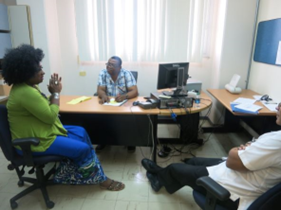 Reducing stigma and discrimination toward vulnerable groups in health care settings can have a positive impact on enrollment in care, retention in care and treatment, and viral suppression of HIV. The Key Populations Preceptorship (KPP) program is a simulated one-on-one patient-provider training program that brings together a health care provider and a preceptorship trainer (PT), who is a member of a key population group, with the observation of a training facilitator. The PT takes on the role of a mock patient and uses a pre-scripted scenario as a guide to interact with the provider-in-training, giving feedback after each scenario. The KPP builds the provider’s capacity to provide comprehensive and nonjudgmental care to key population groups including gay and bisexual men, other men who have sex with men, persons of trans experience, and sex workers.
Reducing stigma and discrimination toward vulnerable groups in health care settings can have a positive impact on enrollment in care, retention in care and treatment, and viral suppression of HIV. The Key Populations Preceptorship (KPP) program is a simulated one-on-one patient-provider training program that brings together a health care provider and a preceptorship trainer (PT), who is a member of a key population group, with the observation of a training facilitator. The PT takes on the role of a mock patient and uses a pre-scripted scenario as a guide to interact with the provider-in-training, giving feedback after each scenario. The KPP builds the provider’s capacity to provide comprehensive and nonjudgmental care to key population groups including gay and bisexual men, other men who have sex with men, persons of trans experience, and sex workers.
The KPP was adapted based on Jamaica’s KPP for clinicians in 2016 for physicians in Trinidad. In 2017, it was adapted for nurses and was delivered in-person over the course of a two-day period. In response to COVID-19 protocols, the KPP for social workers, which was adapted in 2020, was delivered virtually.
To be both cost efficient and effective, the KPP for Clinicians will be made into web modules and be accessible on a Learning Management System (LMS) that is being developed as a collaborative between I-TECH and the University of Washington Department of Global Health’s eLearning Program (eDGH).
In late October 2021, the KPP lost one of its most vibrant PTs when Trinidad and Tobago activist and community leader, Brandy Rodriquez, passed away.